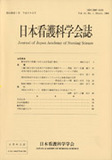Japanese
English
- 販売していません
- Abstract 文献概要
- 参考文献 Reference
- サイト内被引用 Cited by
要旨
本研究は,治療上身体の動きを制限された学童のストレス認知とコーピング過程を探求することを目的とした.安静または物理的に歩行を6日以上禁止された入院中の学童25名を対象として,参加観察法と面接法を実施(10例は制限開始期から解除期まで縦断的に追跡)し,得られた質的データを分析した.
その結果,以下の知見が見いだされた.①動きの制限によるストレスは,自我の脅威と,現実生活における喪失・損傷・脅威の体験として認知され,両者は自己像の損傷・脅威を招いた.②ストレスへのコーピングは、制限開始・継続・解除期と経時的に変化し,各期において特徴的なコーピング様式・行動が認められた.③この変化は,動きの制限により脅かされた自己の保存から,建直しの準備を経て自己再建,自己確立に進む過程を意味し,またそれは,動きを制限された学童がストレス体験を克服し,生活適応と自我の統合に取り組む過程を示唆していた.
Abstract
The purpose of this study was to describe the stress appraisals and coping process under the restriction of mobility. The subjects of this study were 25 hospitalized school-age children who had been on bed rest or restricted of walking more than six days. Participant observation and interview technique were used to collect the data. Within twenty five subjects, ten subjects were followed longitudinally from admission to discharge.
The findings of the result were following. 1. Immobilized children demonstrated that they received a treat to their ego and they recognized their experience as a loss, harm, and threat in their real life. Those experiences harmed and threat their self -image. 2. In response to the immobilization (i. e. stressor), the coping style had changed during the course of immobilization period; beginning, during, and with out immobilization. A variety of coping strategies and behaviors which children used, showed a pattern for each stage. 3. The change of coping style indicated that the process of self-reconstruction which progress from self-preservation of ego threat, preparation for self-reconstruction, to full self-reconstruction. This process also indicated the process of their adjustment to the new environment and reconstruction of personal integrity.
Copyright © 1994, Japan Academy of Nursing Science. All rights reserved.


